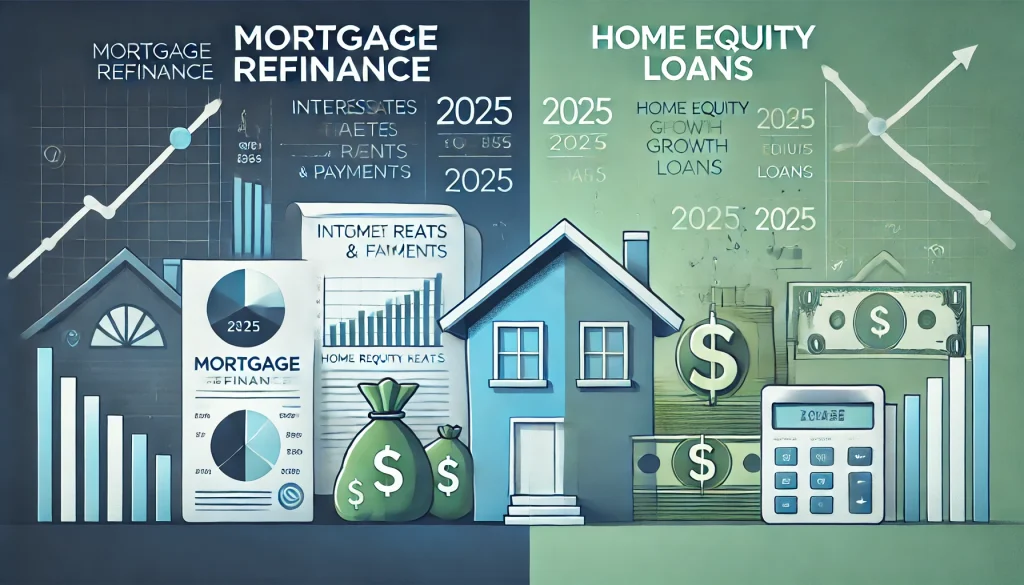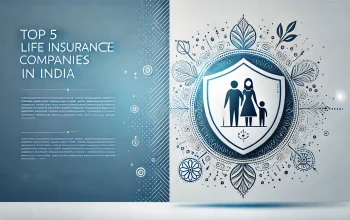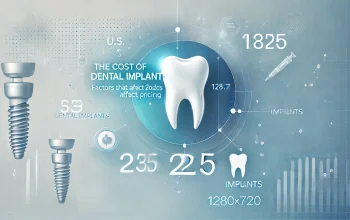Mortgage Refinance vs. Home Equity Loans: Which is the Best Choice for 2025?

When it comes to managing home finances, two of the most popular options for homeowners are mortgage refinancing and home equity loans. Both provide ways to tap into the value of your home, but they come with different advantages and risks. As 2025 approaches, rising interest rates, economic trends, and evolving financial strategies will influence which option might be best for you. This article will explore mortgage refinancing and home equity loans in detail, helping you make an informed decision in 2025.
Table of Contents
Understanding Mortgage Refinance
Mortgage refinancing refers to the process of replacing your existing mortgage with a new one, often at a lower interest rate or with more favorable terms. The primary reasons homeowners refinance include:
- Reducing monthly payments
- Securing a lower interest rate
- Shortening or extending the loan term
- Switching from an adjustable-rate mortgage (ARM) to a fixed-rate mortgage
- Accessing home equity (known as cash-out refinancing)
In 2025, with the anticipated rise in interest rates, refinancing may not always lead to a lower rate. Homeowners who locked in low rates during previous years might find refinancing less beneficial unless they need to change the loan terms.
Pros of Mortgage Refinancing in 2025
- Lower Interest Rates (For Some): If interest rates remain favorable, homeowners may still find opportunities to secure a better rate. This can result in lower monthly payments and save thousands over the life of the loan.
- Opportunity to Cash Out: Cash-out refinancing allows you to borrow more than you owe on your home, using the excess to pay off debt or fund other expenses.
- Consolidating Debt: By refinancing, you can consolidate high-interest debts, such as credit cards or personal loans, into one lower-interest payment.
- Improving Loan Terms: If you previously had an ARM, refinancing can allow you to move to a more predictable fixed-rate mortgage, avoiding future rate hikes.
Cons of Mortgage Refinancing in 2025
- Higher Interest Rates (For Some): Those who secured historically low rates in 2020-2022 may not find refinancing favorable in 2025 if rates have increased. Refinancing could mean locking in a higher rate than the one you currently have.
- Costly Fees: Refinancing comes with various fees, such as closing costs, appraisal fees, and origination fees. These expenses can be substantial, and it may take years for the savings from refinancing to offset these costs.
- Longer Repayment Period: Refinancing may extend the length of your loan, even if you secure a lower monthly payment. This could result in paying more interest over time.
- Equity Requirements: You’ll need sufficient equity in your home to qualify for refinancing, which may be an issue if property values have fallen.
Understanding Home Equity Loans
A home equity loan allows you to borrow against the equity in your home. Unlike a mortgage refinance, a home equity loan is a separate loan that you take on top of your current mortgage. It’s typically issued as a lump sum and repaid over a fixed period at a fixed interest rate. Homeowners often use home equity loans for large expenses, such as home renovations, debt consolidation, or medical bills.
In 2025, with home values continuing to rise, many homeowners will find themselves with substantial equity to borrow against. However, rising interest rates may also make home equity loans more expensive compared to previous years.
Pros of Home Equity Loans in 2025
- Fixed Interest Rates: Unlike HELOCs (home equity lines of credit), home equity loans generally come with fixed interest rates, making them predictable and easier to budget for.
- Large Lump Sum: Home equity loans provide a large sum of money upfront, which can be beneficial for financing major expenses like home improvement projects or paying off high-interest debt.
- Tax Benefits: In some cases, the interest on a home equity loan may be tax-deductible, especially if the loan is used to improve your home.
- Lower Interest Rates than Personal Loans: Compared to unsecured personal loans or credit card debt, home equity loans often have significantly lower interest rates because they are secured by your home.
Cons of Home Equity Loans in 2025
- Higher Monthly Payments: Since you’re adding another loan on top of your existing mortgage, you’ll have an additional monthly payment to manage, which could strain your budget.
- Risk of Foreclosure: Because your home is used as collateral, failing to make payments on a home equity loan can put you at risk of losing your home.
- Interest Rate Sensitivity: Rising interest rates in 2025 may mean that home equity loans have higher rates than what was available in previous years, making them more expensive to borrow.
- Closing Costs: Just like refinancing, home equity loans come with closing costs that can add up, reducing the overall financial benefit of the loan.
Key Differences Between Mortgage Refinance and Home Equity Loans
While both mortgage refinancing and home equity loans allow you to tap into the value of your home, they differ significantly in how they work. Here’s a closer look at some of the key differences:
| Feature | Mortgage Refinance | Home Equity Loan |
|---|---|---|
| Loan Type | Replaces existing mortgage | Separate loan on top of existing mortgage |
| Interest Rate | Typically lower (especially with a rate-and-term refinance) | Fixed rate, generally higher than first mortgages |
| Loan Amount | Based on remaining balance of existing mortgage | Based on available home equity |
| Repayment Terms | 15, 20, or 30 years | 5-15 years (depends on the lender) |
| Fees and Closing Costs | High fees (similar to getting a new mortgage) | Fees apply, though sometimes less than refinance |
| Use of Funds | Can be used to reduce loan payments, change terms, or access equity | Lump sum, often used for large expenses |
How to Choose Between Mortgage Refinance and Home Equity Loans in 2025
Choosing between mortgage refinancing and a home equity loan in 2025 depends on your financial goals, the current state of your mortgage, and the economic landscape. Here are some scenarios to consider:
- Choose Mortgage Refinance if You Want Better Loan Terms
- If you can secure a lower interest rate than your current mortgage (even with rising rates), refinancing might still be a good option.
- Homeowners with ARMs may want to refinance to a fixed-rate mortgage to protect themselves from future rate increases.
- Refinancing is also a smart option if you want to extend your loan term to lower your monthly payments or shorten it to pay off your loan faster.
- Choose a Home Equity Loan if You Need a Lump Sum
- Home equity loans are ideal for homeowners who need a large amount of cash upfront for major expenses, such as home renovations or debt consolidation.
- If you don’t want to disturb your existing mortgage or if refinancing won’t provide any cost savings, a home equity loan allows you to borrow against your home’s value without changing the terms of your mortgage.
- Consider Interest Rate Trends
- With interest rates projected to rise, refinancing might not always result in a lower interest rate. However, for those with equity in their homes, home equity loans or cash-out refinances could still be appealing options.
- Keep an eye on the Federal Reserve’s policies and economic indicators as 2025 unfolds, as interest rates will play a significant role in deciding the best option.
- Factor in Closing Costs and Fees
- Both refinancing and home equity loans come with fees, but they can vary. Refinancing generally has higher fees since you are essentially taking out a new mortgage, while home equity loans may have lower upfront costs.
- Be sure to calculate how long it will take for the savings from a lower rate or improved terms to outweigh the fees you’ll pay.
- Think Long-Term
- If you’re planning to stay in your home for many years, refinancing may provide long-term savings, especially if you can lock in a lower interest rate.
- For short-term needs or projects, a home equity loan may make more sense, as you won’t be resetting the clock on your entire mortgage.
Conclusion
In 2025, choosing between mortgage refinancing and home equity loans will depend on your financial needs, the state of the housing market, and how interest rates evolve. While refinancing offers a way to change the terms of your mortgage or tap into your home’s equity, home equity loans provide an additional borrowing option without affecting your existing mortgage. As interest rates rise, carefully consider the pros and cons of each option to make the best choice for your financial future. Always consult with a financial advisor or mortgage specialist before making any major decisions.
By understanding the key differences and evaluating your individual circumstances, you can make a well-informed choice that aligns with your financial goals in 2025 and beyond.


